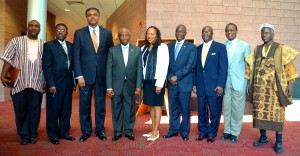- Posted in All University
- Category: Campus News
 LINCOLN UNIVERSITY, PA – A Republic of Liberia delegation, including the nation’s Vice President, its Ambassador-to-the-United States and other officials, visited The Lincoln University last week to discuss additional partnership opportunities on grants, research, faculty and student exchanges, capacity building and curriculum reforms to transform its K-16 educational institutions.
LINCOLN UNIVERSITY, PA – A Republic of Liberia delegation, including the nation’s Vice President, its Ambassador-to-the-United States and other officials, visited The Lincoln University last week to discuss additional partnership opportunities on grants, research, faculty and student exchanges, capacity building and curriculum reforms to transform its K-16 educational institutions.
University Provost and Vice President of Academic Affairs Dr. Kenoye K. Eke, Sr. hosted a June 21st luncheon and meeting with the Liberian delegation and university officials at the International Cultural Center, which addressed a number of initiatives The Lincoln University has engaged in both as an independent institution and also as part of consortium of universities either partnering with the Republic of Liberia’s Ministry of Education or directly with individual colleges and universities there.
“I am most thrilled by the expression of efforts to increase Lincoln’s global engagements with governments and universities abroad,” said Dr. Eke. “(These efforts) will only help us to better serve and prepare our students for the global economy of the 21st century.”
Since its founding, Lincoln has had a longstanding relationship with Africa, and Liberia, in particular. Established as Ashmun Institute in 1854, its namesake Jehudi Ashmun, a religious leader and social reformer, was involved with the American Colonization Society, which supported the return of free African Americans to Africa and helped found the colony of Liberia as a place for freedmen. Ashmun served as served as the United States government’s agent in the Liberia colony and as such its de facto Governor.
Lincoln’s (then-Ashmun Institute) earliest intent was to prepare clergy and laymen who would evangelize Blacks, both in the United States and in Africa. John Miller Dickey, the founder and first president of the college, encouraged some of his first students: James Ralston Amos, his brother, Thomas Henry Amos, and Armistead Hutchinson Miller, to support the establishment of Liberia as a colony for African Americans.
In addition, Liberians were among the earliest international students at Lincoln.
“I am honored to be on this historic campus,” said His Excellency Joseph N. Boakai, Sr., Vice President of the Republic of Liberia. “This is an effort to rebuild our country on the basis of sound education. We do have ongoing discussions and collaborations with other universities and we are here to do a follow-up on the MoU that supports exchanges for students and faculty.”
In November, Lincoln was also among a consortium of colleges, universities and agencies, facilitated by the city of Philadelphia, including Cheyney University, Drexel University, the University of Pennsylvania, Philadelphia’s Revitalization & Education Program/Labor and International Foundation for Education & Self-Help, which signed a Memorandum of Understanding (MoU) with Liberia’s Ministry of Education to potentially collaborate on grant initiatives, faculty and student exchanges, curriculum development and research.
More recently, Lincoln submitted a USAID grant proposal, in conjunction with North Carolina A&T, Cheyney University and the William V.S. Tubman University in Liberia and a group of Liberian community colleges, to study agricultural business ventures and infrastructure and to develop curriculum supporting innovation and entrepreneurial opportunities in Liberia.
Liberian Ambassador Jeremiah C. Sulunteh, also strongly recommended that Lincoln establish its own MoU directly with the Ministry of Education as part of an initiative for capacity building and curriculum reforms for their K-16 educational institutions.
Boakai, who added that the same partnership idea was proposed with Winston-Salem University, explained that $500,000 was available to help support such an initiative with Liberia’s Ministry of Education.
The Lincoln University, founded in 1854 as the nation’s first degree-granting Historically Black College and University (HBCU), combines the elements of a liberal arts and science-based undergraduate curriculum along with select graduate programs to meet the needs of those living in a highly-technological and global society. Today, the University enrolls a diverse student body of approximately 2,000 men and women. Internationally recognized for preparing and producing world class leaders such as Thurgood Marshall, the first African American U.S. Supreme Court Justice, Lillian Fishburne, the first African American woman promoted to Rear Admiral in the U.S. Navy, Langston Hughes, the noted poet, Kwame Nkrumah, the first President of Ghana and Nnamdi Azikiwe, the first President of Nigeria.